一位母亲的选择 A Mother’s Choice
希伯来书 Heb 11:23–27
Remember these points
I put these points at the top of my sermon-prep template to remind myself every week:
- Show that main point of passage relates to Jesus and his saving work
- (1 Cor 1:18) A truly gospel-centred message will not be acceptable in a synagogue or mosque
- Did I proclaim the gospel as the headline news of the sermon, rather than as a “by the way…”?
- Unbelievers are called to repent, believe, and be saved
- Believers are encouraged to abandon their old self, renew their minds, put on the new self in Christ
- Preach simple sermons, so that God’s people can see Christ more clearly and love him more dearly
News
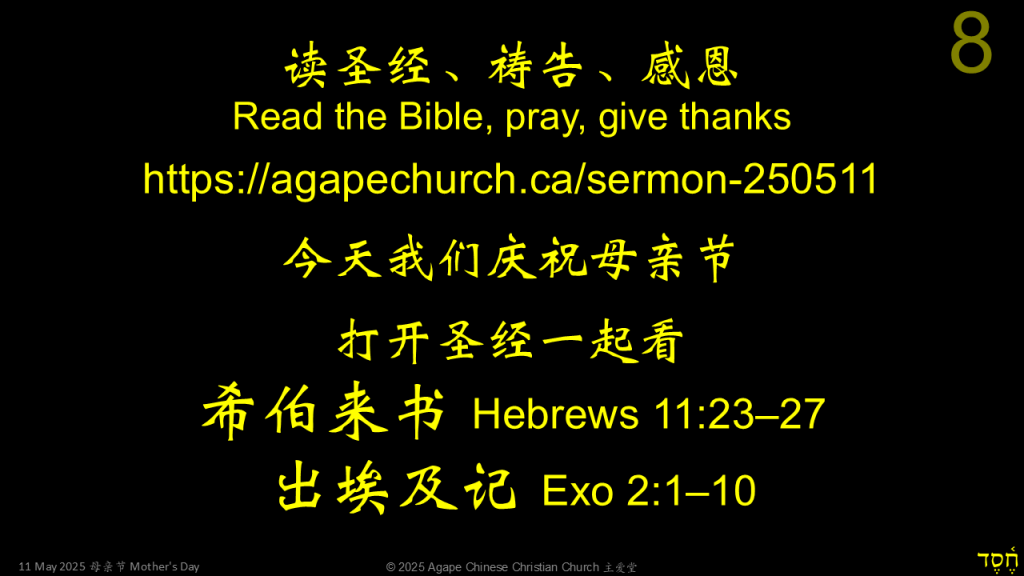
Hook
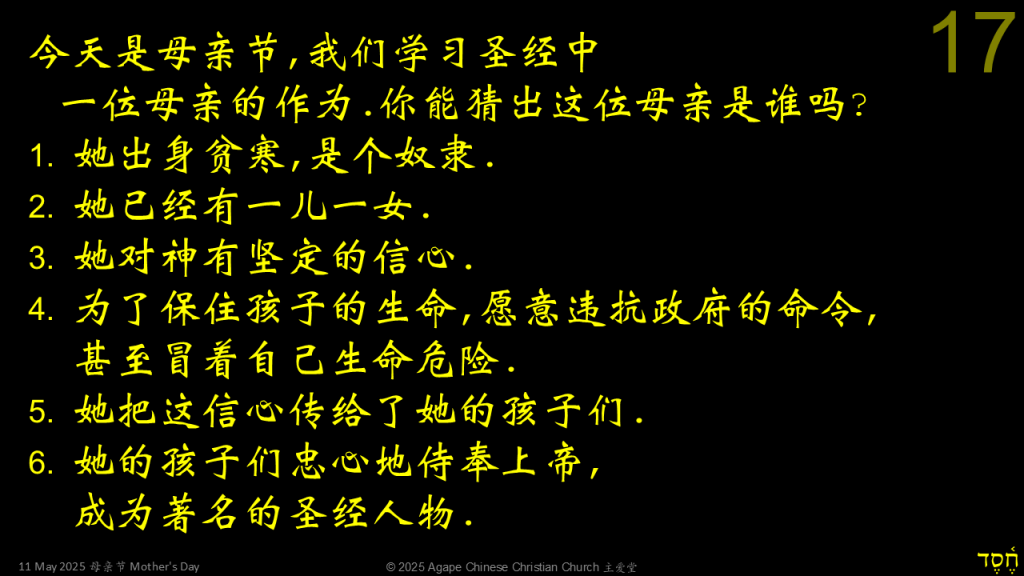
Today is Mother’s Day, so we’ll study the actions of a mother from the Bible:
- She was from a poor family, a slave.
- She has a son and a daughter.
- She had great faith in God.
- She was willing to defy the government to keep her child alive, even risking her own life.
- She passed on her faith to her children.
- Her children served God faithfully, became famous Bible characters.
Can you guess who this mother might be?
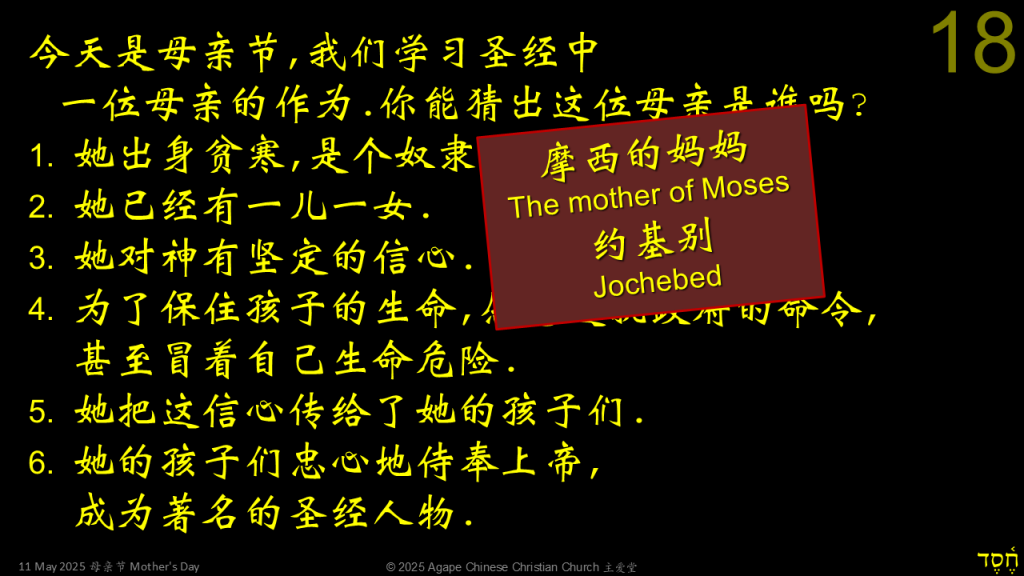
Passage
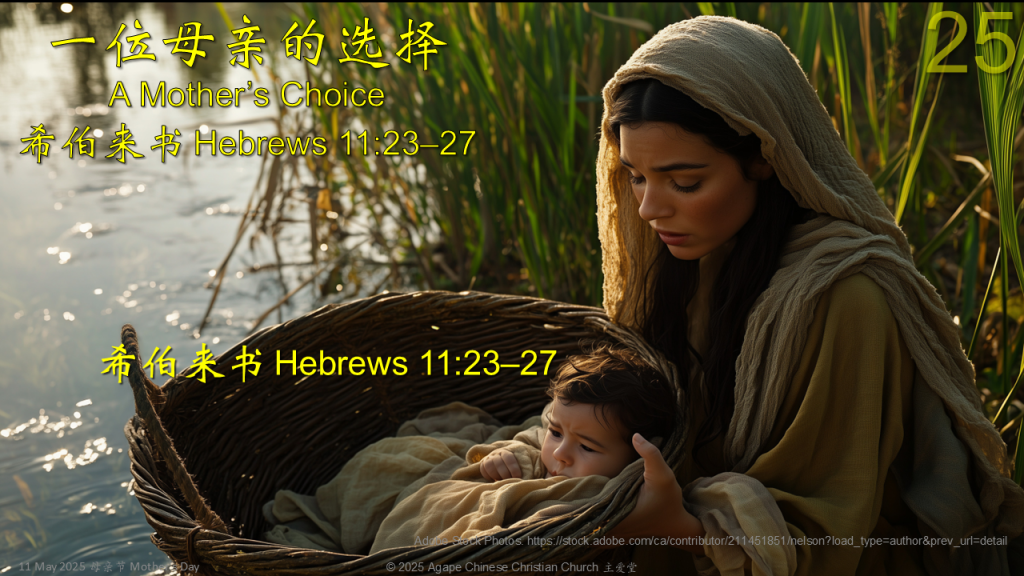
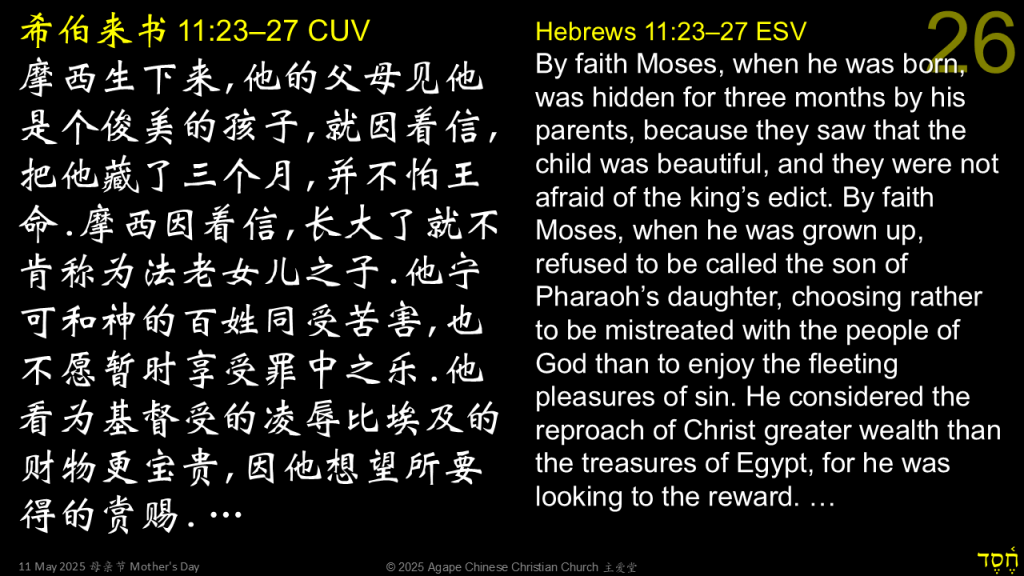
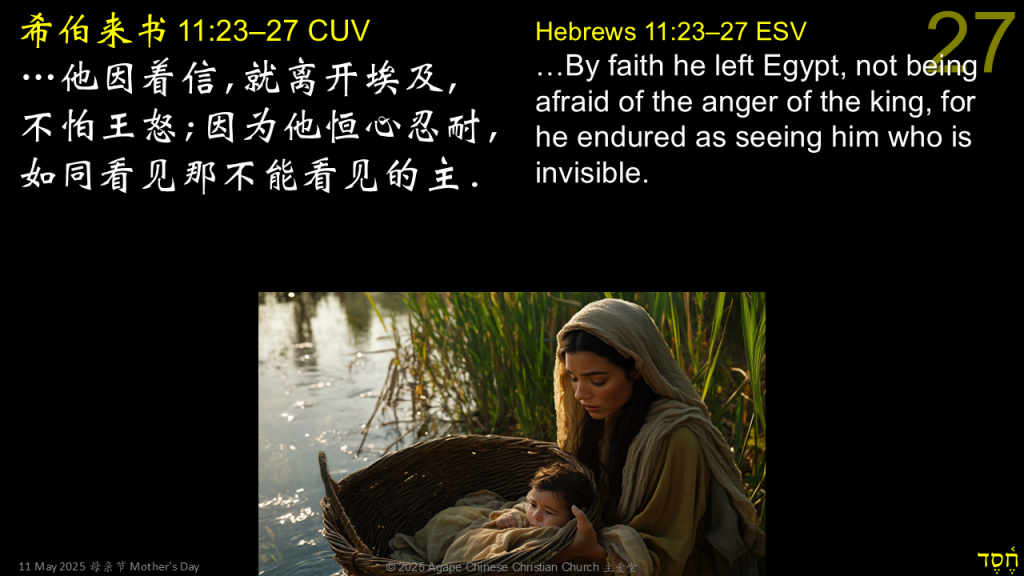
Contents here
Outline
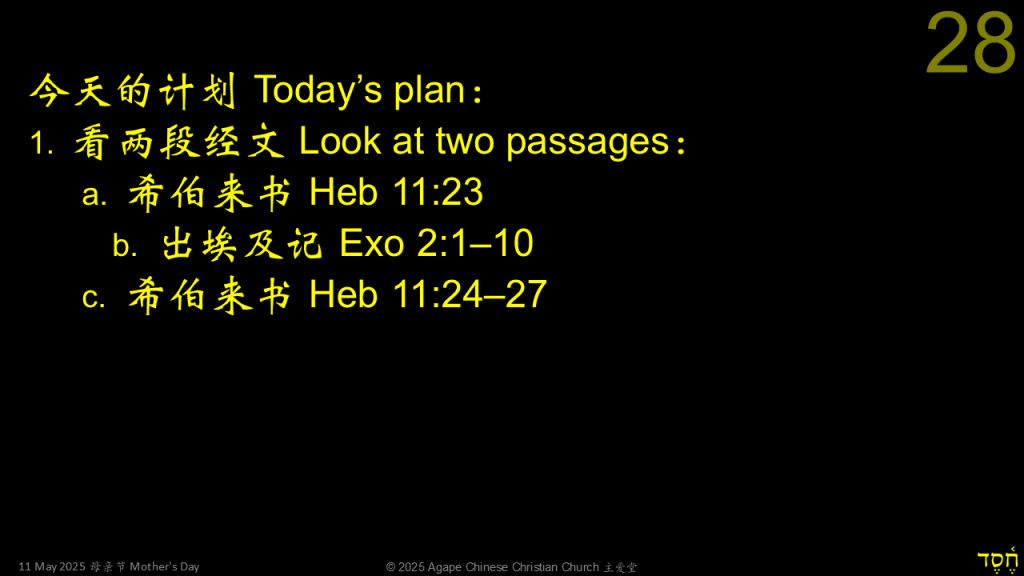
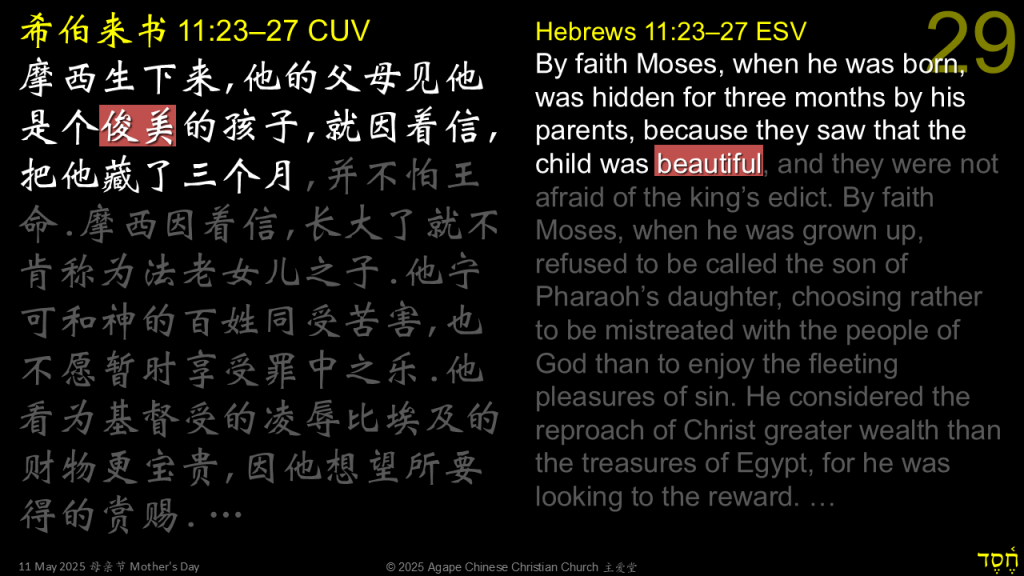
Mothers: Did you “evaluate” your baby child to see if he/she was beautiful?
Every mother naturally sees her baby as beautiful, so why would Jochebed evaluate her baby?
Where have we heard a similar expression: “saw that the child was beautiful?”
Way back in Gen 1:4, right after God created light “神看光是好的 And God saw that the light was good.”
Why hide the baby? Because of Pharaoh’s decree that all Hebrew male babies are to be thrown into the Nile to drown.
Some Jewish Rabbis said God gave Miriam a vision that her unborn baby brother will be the deliverer that will lead the Hebrews to freedom (see Exo 15:20)
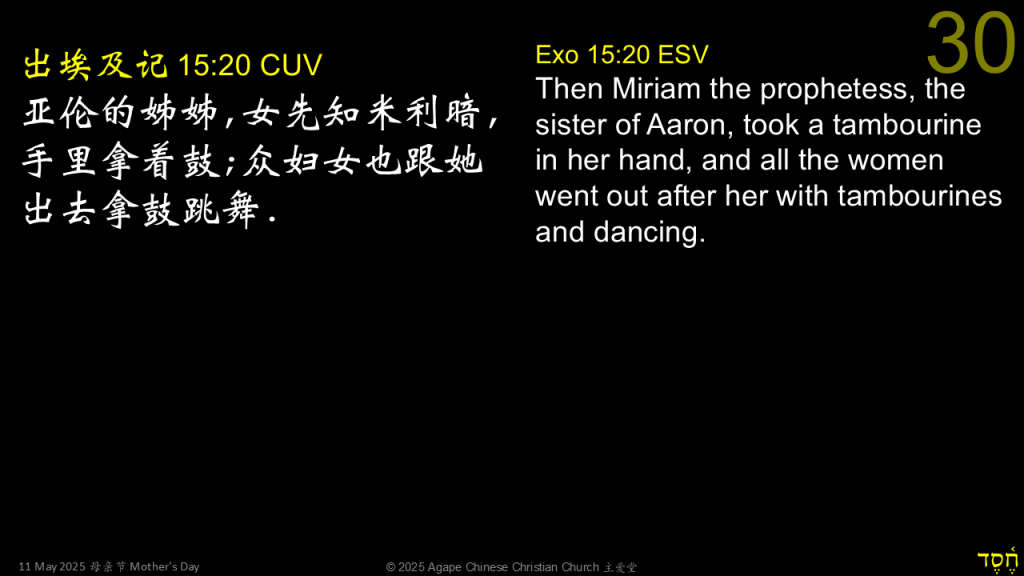
They also said when Moses was born, the house filled with light, so they realised Miriam was right: this will be a special child.
This is why Jochebed was will to risk everything to keep Moses alive.
This is all speculation, of course! But it makes for an interesting story.
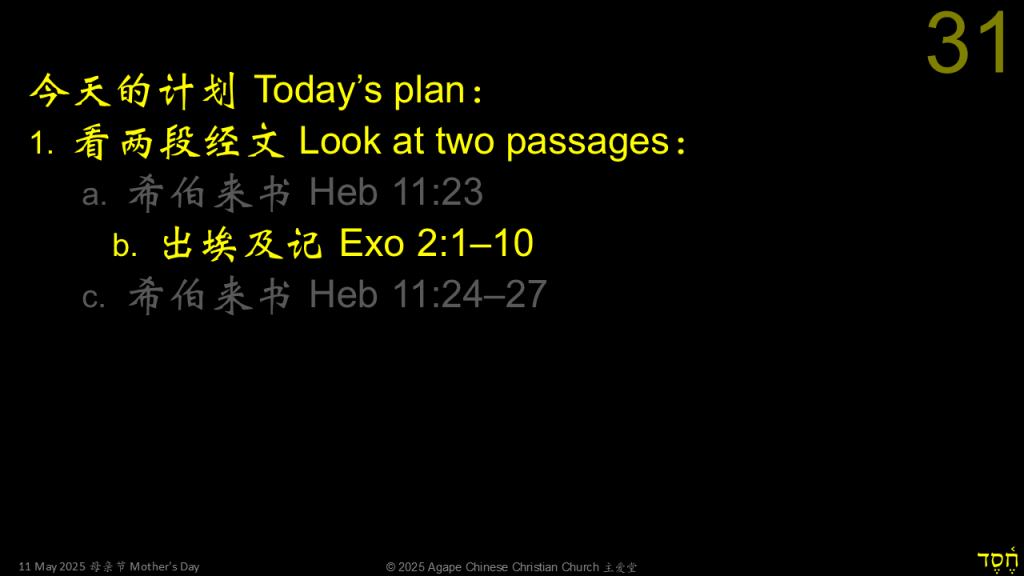
Now we leave Heb 11 at verse 23, and go to Exo 2.1–10.
Heb 11:23 is like a summary of Moses’ birth. We go to Exo 2 to get the details.
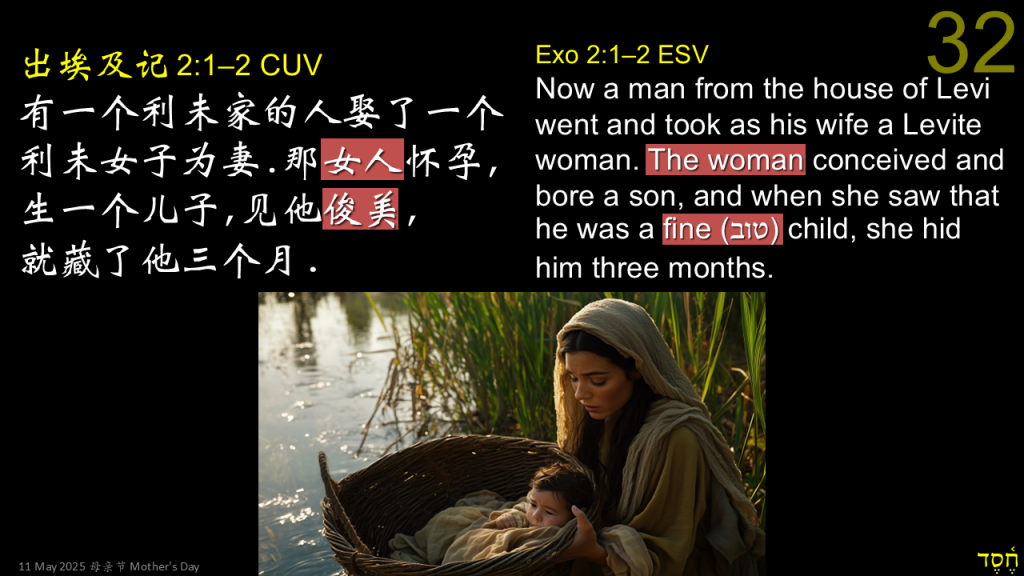
We concentrate on the woman (mother), it’s Mother’s Day afterall!
We see the same adjective: a find child (Hebrew טוב tov)
She hid him for 3 months:
- She’s not afraid of Pharaoh.
- She’s willing to risk her life for the baby? Why?
- Because of faith. Faith in God that he will use her baby to deliver the Hebrews.
After 3 months, can no longer hide the baby:
- There are Egyptians soldiers ready to grab any Hebrew male baby.
- Neighbours might tattletale on Jochebed.
So she had to do something.
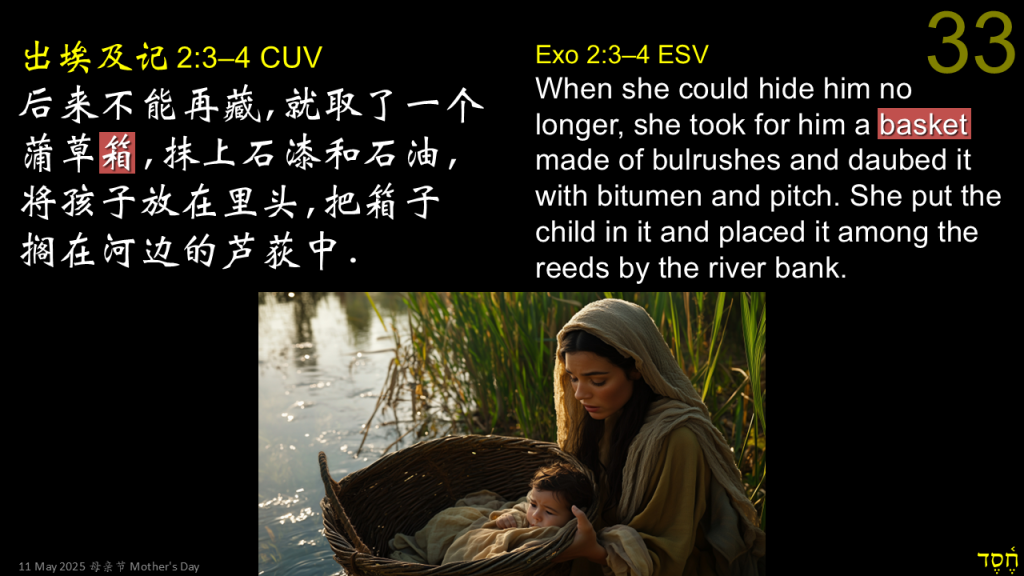
The word translated “basket” occurs only 2x in the entire OT:
- Once here in describing Moses’ basket.
- Previously in Gen 6–9, Noah’s ark.
The ark that saved Noah and his family, the basket that saved Moses, were both described the same way (תֵּבָה).
She put the baby in the basket (ark), and the basket in the river.
The bitumen and pitch will keep the basket from sinking, but only for a short time.
There can be many dangers:
- Crocodiles can come eat the baby.
- Soldiers can come by and see that basket, then kill the baby.
- The basket will eventually sink, drowning the baby.
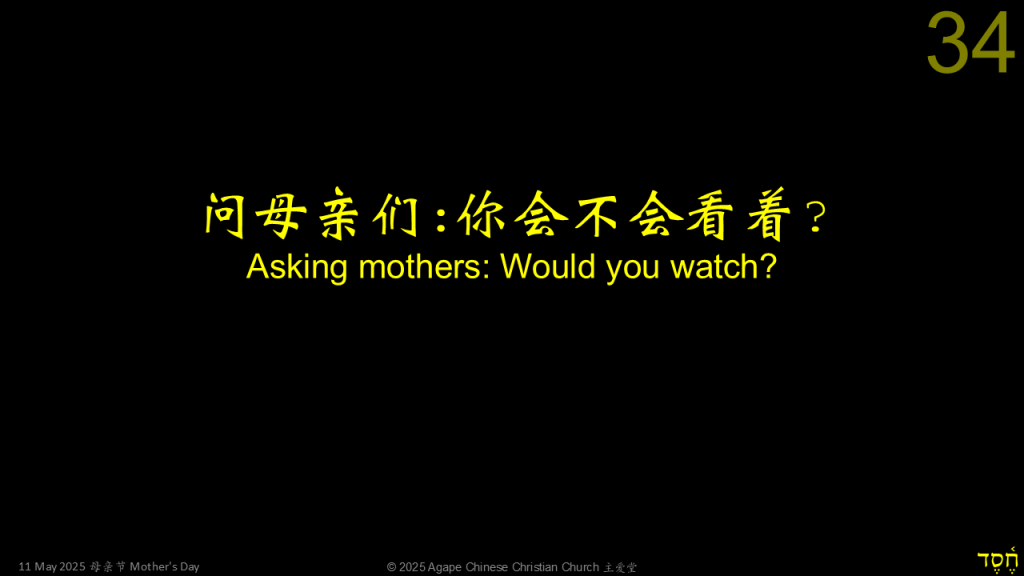
Imagine this was your baby. Would you watch what might happen to it, or would you rather just not know?
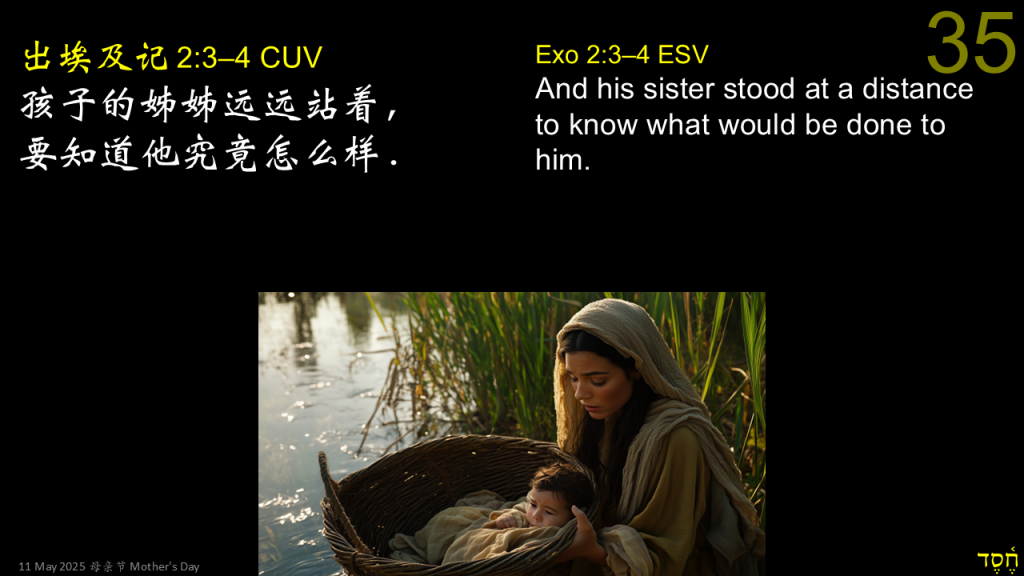
The elder sister, Miriam, followed the basket, to see what would happen to her brother.
Maybe she wants to confirm that her prophecy is real.
Guess who finds the basket? Pharaoh’s daughter!
Do you think it’s good or bad situation? Why or why not?
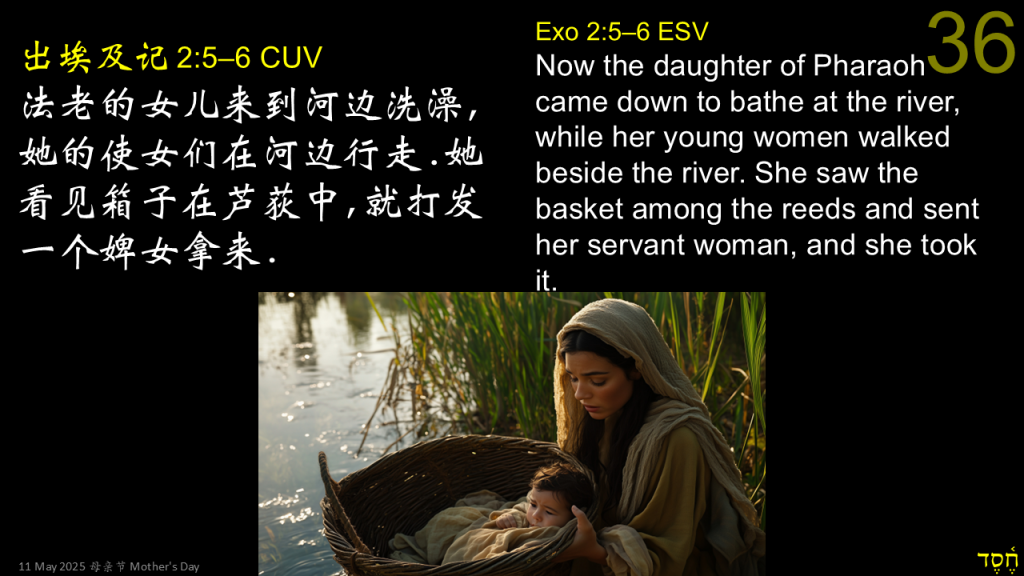
T
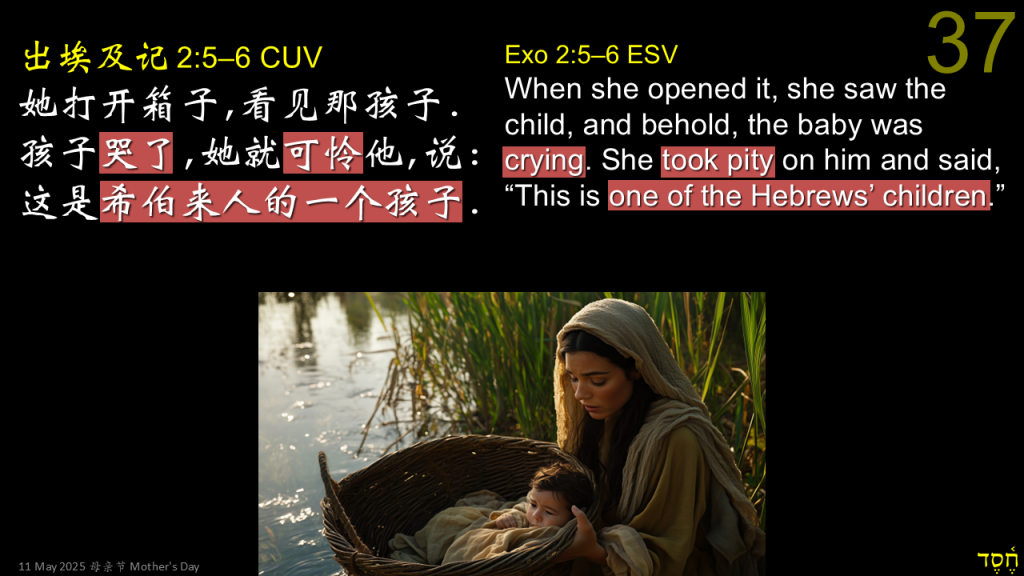
The baby cried when she looked, so took pity on him. NET Bible has a good note on what “took pity” means:
The verb could be given a more colloquial translation such as “she felt sorry for him.” But the verb is stronger than that; it means “to have compassion, to pity, to spare.” What she felt for the baby was strong enough to prompt her to spare the child from the fate decreed for Hebrew boys. Here is part of the irony of the passage: What was perceived by many to be a womanly weakness—compassion for a baby—is a strong enough emotion to prompt the woman to defy the orders of Pharaoh. The ruler had thought sparing women was safe, but the midwives, the Hebrew mother, the daughter of Pharaoh, and Miriam, all work together to spare one child—Moses
The next sentence showed us the conflict: she recognised that this is a Hebrew baby.
What to do? Pity the baby and save it, or follow her father’s decree and drown it?
She cannot yet decide. And it’s at this moment that Miriam came forward with her question.
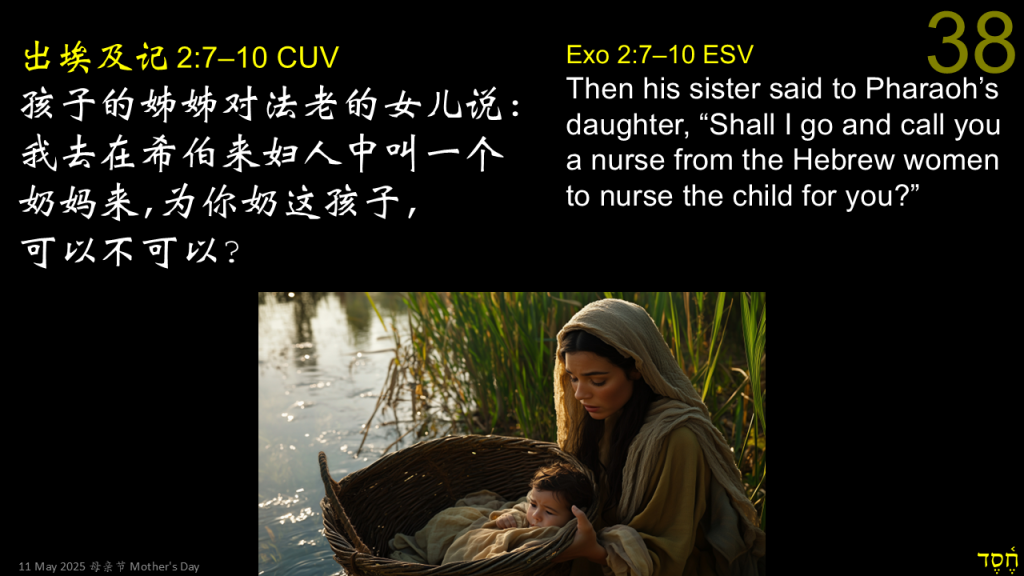
Notice how smart Miriam is:
- She noticed the conflict inside the mind of Pharaoh’s daughter: Obey her father and kill the baby, or pity the baby and let him live.
- What did Miriam think Pharaoh’s daughter would do with the baby?
“Nurse the child for you.” She knew Pharaoh’s daughter would want the baby for herself. - Why would Pharaoh’s daughter want a baby that’s not her own? She’s most likely childless, that explains her longing for a baby (which Miriam felt). Is she married? Most likely, otherwise her desire for a baby is difficult to explain. She’s likely married, but can’t have children.
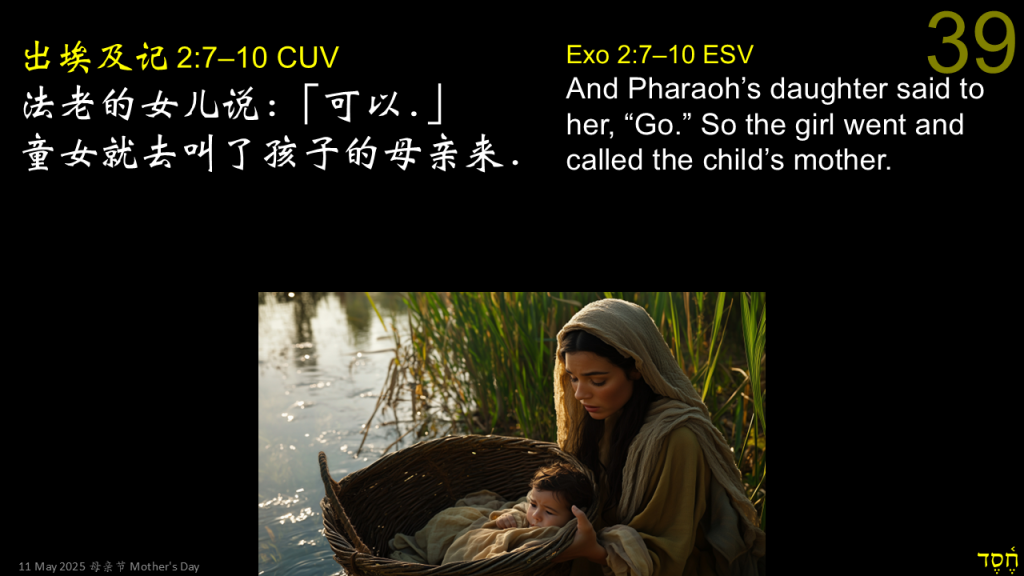
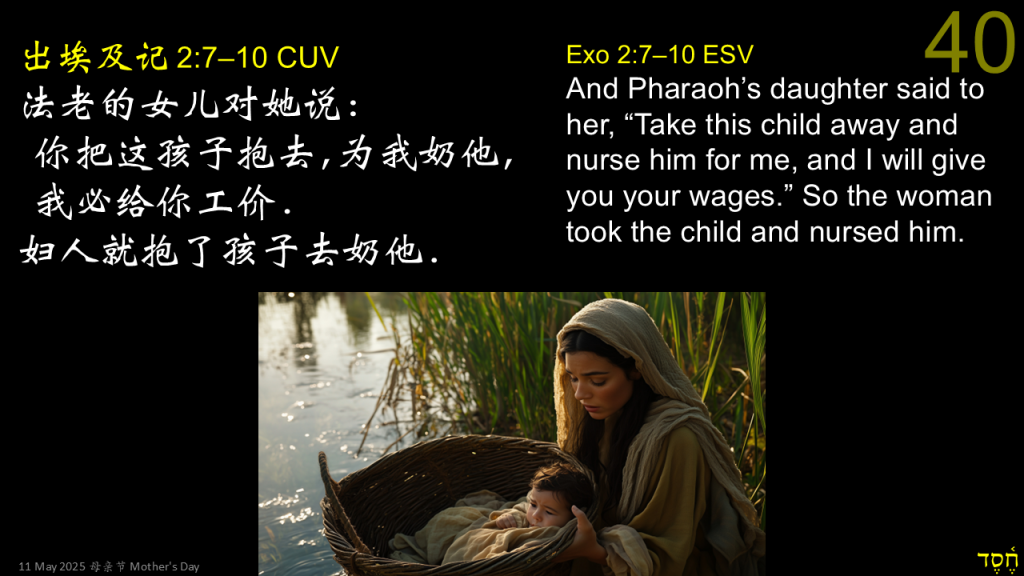
Again, Miriam is very smart. She asked permission to nurse the baby for Pharaoh’s daughter. This will:
- Give Pharaoh’s daughter time to figure how she can keep the baby and not get in trouble with her father (or husband).
- Miriam’s youngest brother will be nursed by his own mother (and get paid doing it!) How ideal is that?
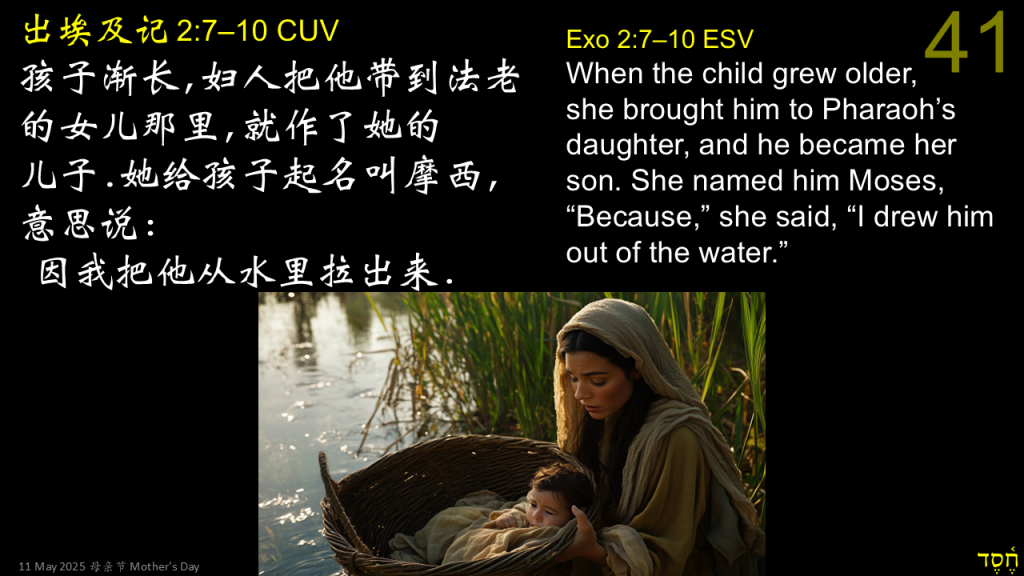
The child grew and was weaned. About how long do you think it takes to wean a child?
Today, it’s relatively short, maybe a year or so. In ancient times, infant mortality was a real problem, and an infant surviving past weaning was cause for celebration.
In biblical times, it was probably 18-months to 4 years before being weaned.
What do you think the baby’s mother did during these years at home?
It was only after weaning that the baby got his name: Moses.
His mother never gave him a name.
It seems her only duty was to make sure he survived, and learned about God.
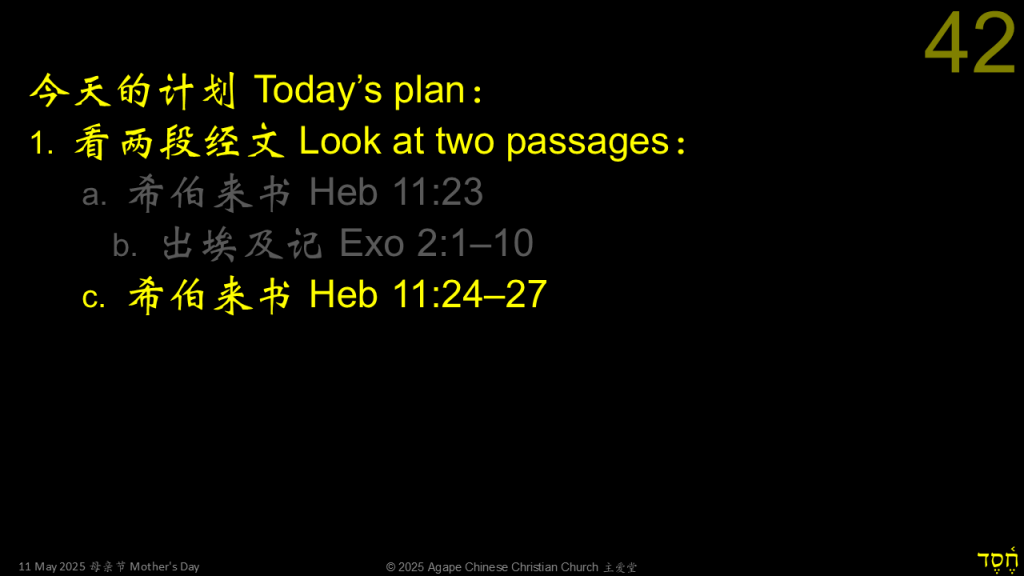
And now, back to Heb 11:24–27.
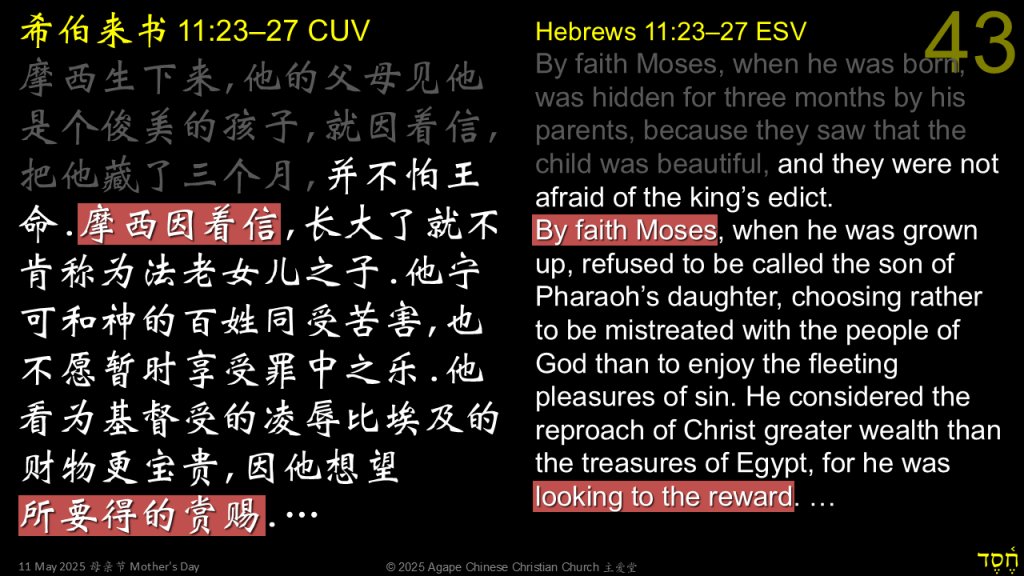
“By faith, Moses…” Where do you think he got his faith? From his mother Jochebed, during the short time they were together at her home.
Many scholars believed that while growing up, Moses probably had regular contact with his family, but we don’t know this for sure.
Moses looking for the reward. What reward? To be in the kingdom of God.
But he didn’t get to see it. He didn’t even get to enter Canaan, the “preview” of God’s kingdom.
He had faith in God.
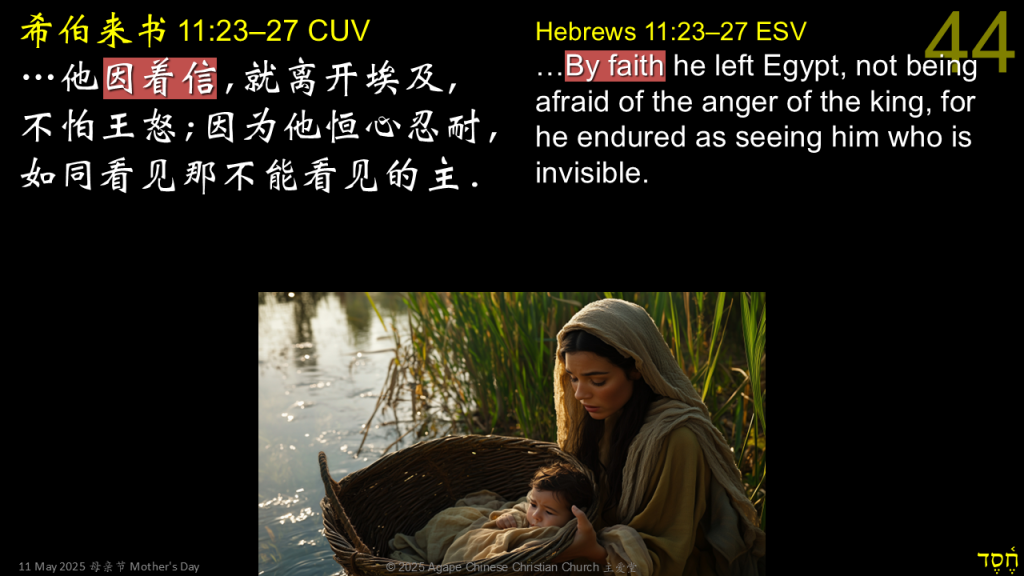
His faith kept him going, continuing to serve God until he died.
Where did this faith originated? From his mother.
与我有什么关系? So What?
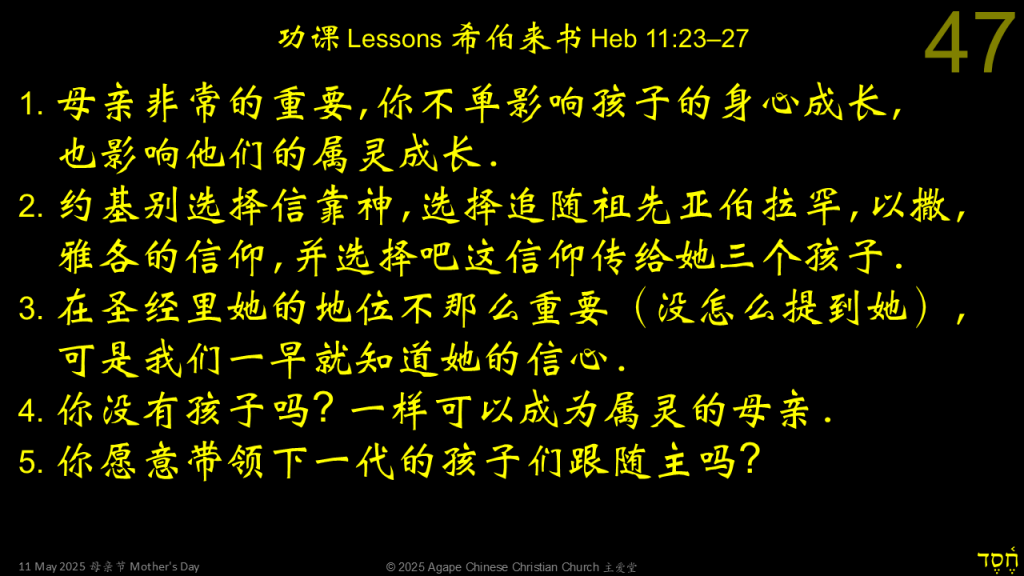
- Mothers are supremely important. You’re not just impacting your child’s physical and mental growth,
but their spiritual growth as well. - Jochebed chose to put her faith in God, chose to follow the faith of her ancestors Abraham, Isaac, and Jacob,
and chose to pass this faith and belief on to her three children. - She didn’t seem too important in the Bible (she was only mentioned twice in the entire Bible),
but we learned of her faith right from the start (Exo 2:1–10). - You don’t have children? No problem! You can also be a “spiritual” mom to the next generation.
- Are you willing to guide the next generation of children to follow the Lord?
